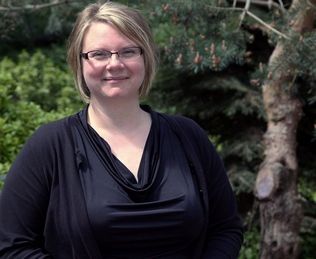
Sheryl Copeland is the Counseling and Wellness Services director at Edmonds Community College.
Theresa Goffredo, The Herald
One might say that healthy students and staff make for a healthy campus.
That’s the aim of a new program that’s set to begin in the fall at Edmonds Community College.
The college recently was awarded a $369,000 grant from Verdant Health Commission to create a Wellness and Health Promotion program for students and campus employees.
The ultimate mission of the new program is to keep students enrolled and employees working by helping them to find ways to address their wellness and health concerns so they can reach their goals, whether those goals are academic or professional.
“We are creating that culture of support,” said Sheryl Copeland, “That’s why I’m here, I want people to reach their goals.”
Copeland, recently named the college’s Director of Counseling and Wellness Services, will direct the new program.
The program will hire a full-time project coordinator and a part-time substance abuse specialist and two student programmers.
Copeland said she hoped to have several positions filled by early August so the program can start helping the campus community by the beginning of fall semester.
The grant will fund the program for two years and a half years. College leaders are in the early stages of talking about ways to fund the program to keep it going, Copeland said.
One of the top priorities for the college is to promote health literacy and healthy interpersonal relationships and promote the benefits of nutrition and exercise.
The new wellness promotion program can help students and staff identify health and wellness issues such as a learning disability or a substance abuse problem and get them help dealing with those issues.
“When a student is facing so many responsibilities, a lot of ‘now’ things crowd out the future,” Copeland said. “We want to look at the student holistically and get them connected to a resource to reduce the barrier, whether that’s an academic learning disability or medical or mental health concern. It’s hard to do homework when you think there’s no point.”
Copeland joked that the campus doesn’t have a force field that keeps life out and that many life stressors, such as juggling work and school or juggling a child and school, can lead to a student or staff’s failure to complete a degree or stay on the job. The new wellness and health center would offer a place for challenged students and staff to go to seek help.
Edmonds Community College has a diverse student population, made up of high school students, about 350 veterans using their GI bill, about 50 percent on financial aid, about 14 percent on disability, 25 percent in basic skills programs such as getting their GED, 31 percent have dependants and almost half are working.
So these are vulnerable populations, Copeland said.
So part of the program’s goal is to empower the students and staff to take an active role in their well being.
“Helping them be advocates for themselves,” Copeland said, and equipping them with important, lifelong self-care skills.
Unhealthy students create more of an impact in the classroom because of bad behavior that is manifested because “it’s life stuff going on how and that’s how they are exhibiting their reaction to the stress,” Copeland said.
“So let’s figure out how we can get you connected to the stress and see how that could be reduced.”
Copeland said she wants the program to look at the whole system.
“Ours is going to be much more global and more visible and accessible,” Copeland said. “We could be a model for other community and technical colleges and it’s very exciting.”
